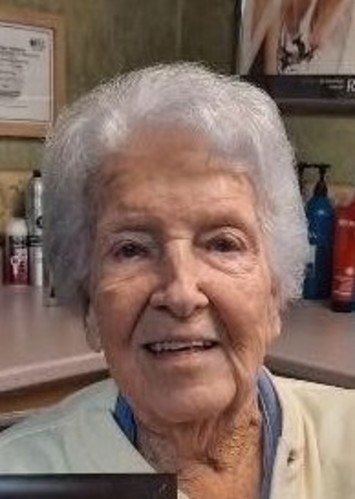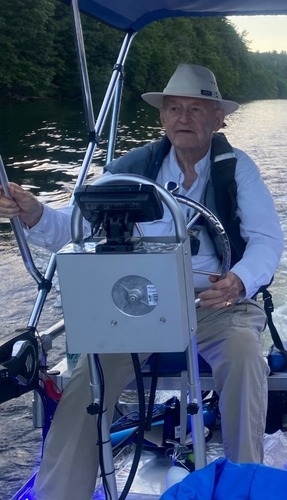
Blueberries, honey, flowers and more: Dunbarton gets a new farmers’ market
Maria Donnelly arranged 60 jars of jam under her tent at Stark Farm Organic Blueberries and watched as, within 90 minutes, her supply ran out.

Sudden pile of trash near Exit 13 on Manchester Street in Concord considered ‘illegal dumping’
Concord Police are investigating the source of a pile of trash placed next to the Exit 13 on-ramp of I-93 some time Wednesday.
Most Read
 Sudden pile of trash near Exit 13 on Manchester Street in Concord considered ‘illegal dumping’
Sudden pile of trash near Exit 13 on Manchester Street in Concord considered ‘illegal dumping’
 Motorcyclist being evaluated at Concord Hospital after crash with mail truck
Motorcyclist being evaluated at Concord Hospital after crash with mail truck
 Hometown Hero: Sarah Guinther is ‘changing the world, one cookie at a time’ through the Maddi-Hatter Cookie Company
Hometown Hero: Sarah Guinther is ‘changing the world, one cookie at a time’ through the Maddi-Hatter Cookie Company
 Merrimack Valley schools to consider eliminating most Penacook bus routes
Merrimack Valley schools to consider eliminating most Penacook bus routes
 Memorial Field Committee inches toward final conceptual plan and will receive more accurate cost estimates on Aug. 12th
Memorial Field Committee inches toward final conceptual plan and will receive more accurate cost estimates on Aug. 12th
 OSHA investigates Pittsfield partial building collapse
OSHA investigates Pittsfield partial building collapse
Editors Picks
 A Webster property was sold for unpaid taxes in 2021. Now, the former owner wants his money back
A Webster property was sold for unpaid taxes in 2021. Now, the former owner wants his money back
 Report to Readers: Your support helps us produce impactful reporting
Report to Readers: Your support helps us produce impactful reporting
 City prepares to clear, clean longstanding encampments in Healy Park
City prepares to clear, clean longstanding encampments in Healy Park
 Concord area population growth in line with state as a whole from 2020 to 2024
Concord area population growth in line with state as a whole from 2020 to 2024
Sports

Athlete of the Week: Michael Heine, Merrimack Valley High School
Michael Heine was a standout football and lacrosse player for Merrimack Valley High School, with his biggest impact coming on the gridiron as a tight end and defensive end.
Opinion

Opinion: Trumpism in a dying democracy
 Opinion: What Coolidge’s century-old decision can teach us today
Opinion: What Coolidge’s century-old decision can teach us today
 Opinion: The art of diplomacy
Opinion: The art of diplomacy
 Opinion: After Roe: Three years of resistance, care and community
Opinion: After Roe: Three years of resistance, care and community
 Opinion: Iran and Gaza: A U.S. foreign policy of barbarism
Opinion: Iran and Gaza: A U.S. foreign policy of barbarism

Your Daily Puzzles

An approachable redesign to a classic. Explore our "hints."

A quick daily flip. Finally, someone cracked the code on digital jigsaw puzzles.

Chess but with chaos: Every day is a unique, wacky board.

Word search but as a strategy game. Clearing the board feels really good.

Align the letters in just the right way to spell a word. And then more words.
Politics

New Hampshire school phone ban could be among strictest in the country
When Gov. Kelly Ayotte called on the state legislature to pass a school phone ban in January, the pivotal question wasn’t whether the widely popular policy would pass but how far it would go.
 Sununu decides he won’t run for Senate despite praise from Trump
Sununu decides he won’t run for Senate despite praise from Trump
Arts & Life

League of NH Craftsmen 92nd annual fair coming to Newbury
The League of New Hampshire Craftsmen will hold its 92nd annual Craftsmen’s Fair from Saturday, August 2 to Sunday, August 10. The fair will take place at Mount Sunapee in Newbury.
 Community Players of Concord celebrate 97th season, prepare for 98th
Community Players of Concord celebrate 97th season, prepare for 98th
 Henniker Blues, Brews & BBQ Fest returns for fourth year
Henniker Blues, Brews & BBQ Fest returns for fourth year
 Artist Spotlight: Holly Emrick
Artist Spotlight: Holly Emrick
 Concert on the lawn coming to Pierce Manse
Concert on the lawn coming to Pierce Manse
Obituaries
 Dorothea Flanders Blackie
Dorothea Flanders Blackie
Dorothea "Sissy" Flanders Blackie Concord, NH - Dorothea "Sissy" Flanders Blackie, age 68, of Concord passed away on January 27th, 2025. She was predeceased by her life partner of 30 years, Bruce Blackie of Concord; her parents Dorothy ... remainder of obit for Dorothea Flanders Blackie
 Lola B. Jones
Lola B. Jones
Boscawen, NH - Lola B. (Burley) Jones, 92, passed away on July 14, 2025, at home surrounded by her family and friends after a long illness. Lola was born in Grafton, NH, on May 9, 1933, to Ralph and Nettie (Lord) Burley. She attende... remainder of obit for Lola B. Jones
 Neil Richard Hurd
Neil Richard Hurd
Bow , NH - Neil Richard Hurd, born November 27, 1941, passed in the comfort of his home in Bow, snuggled up to his trusted dog and in the company of his loved ones on July 19, 2025. His final days were lived with the same heroism he sho... remainder of obit for Neil Richard Hurd
 Richard Cilley
Richard Cilley
Richard (Dick) Cilley North Bend, WA - Peacefully passing on May 9, 2025, Richard A. (Dick) Cilley will be remembered for his love and respect for our military, his commanding leadership, his quirky sense of humor, and his unwavering com... remainder of obit for Richard Cilley


 John Herbert, longtime Salisbury moderator and selectman, dies at 82
John Herbert, longtime Salisbury moderator and selectman, dies at 82
 Arts Ahead: Your ticket to the weekend’s events
Arts Ahead: Your ticket to the weekend’s events
 Tires and drivers tested at New Hampshire Motor Speedway
Tires and drivers tested at New Hampshire Motor Speedway
 WWII veteran turns 101 in Tilton: ‘I had a feeling I’d make it’
WWII veteran turns 101 in Tilton: ‘I had a feeling I’d make it’
 Near Canadian border, local police hail Northern Border Alliance as a visible deterrent to illegal immigration
Near Canadian border, local police hail Northern Border Alliance as a visible deterrent to illegal immigration

 Concord National LL Softball to play in second game of NE Regional on Tuesday after loss to Guilford, Connecticut
Concord National LL Softball to play in second game of NE Regional on Tuesday after loss to Guilford, Connecticut Bow Brook Tennis Club hosts men’s A and B tournaments
Bow Brook Tennis Club hosts men’s A and B tournaments Concord National LL Softball wins State Championship and moves on to Little League Regional Tournament
Concord National LL Softball wins State Championship and moves on to Little League Regional Tournament Josiah Hakala of Beaver Meadow wins State Amateur golf championship
Josiah Hakala of Beaver Meadow wins State Amateur golf championship Concord became a Housing Champion. Now, state lawmakers could eliminate the funding.
Concord became a Housing Champion. Now, state lawmakers could eliminate the funding. ‘A wild accusation’: House votes to nix Child Advocate after Rep. suggests legislative interference
‘A wild accusation’: House votes to nix Child Advocate after Rep. suggests legislative interference  Town elections offer preview of citizenship voting rules being considered nationwide
Town elections offer preview of citizenship voting rules being considered nationwide
